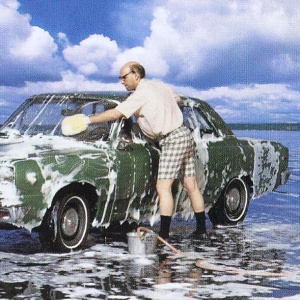How Do Automobiles Affect Stormwater?
Motor oil and other hazardous chemicals leak from our vehicles and are washed into storm drains and eventually into our rivers, the source of our drinking water.
Just one quart of oil can contaminate 250,000 gallons of water.
Dirty water from outdoor car-washing drains into our waterways, carrying pollutants such as grease, oils, phosphates and heavy metals, all of which are unhealthy for people and fish.
Practice Clean Automobile Maintenance
If you change your oil at home, be sure to take the used oil to a proper disposal location. Many auto supply stores, car care centers, and gas stations will accept used oil. Use the resources below to find a disposal site.
DO NOT pour motor oil or any other automotive fluids into a stormwater drain, onto the street, into your yard, into the drain or into the garbage.
When changing motor oil, place a drip pan underneath the vehicle to collect as much oil as possible and prevent spills. Then, loosen the old oil filter, spin it off and drain as much oil as possible into the drip pan.
Pour used oil into a clean, empty plastic container with a tight lid and do not mix it with any other substances.
Check your car or truck for drips and oil leaks regularly and fix them promptly. Keep your vehicle tuned to reduce oil use.
Use ground cloths or drip pans under your vehicle if you have leaks
or if you are doing engine work. Clean up spills immediately and
properly dispose of clean-up materials.
Use drain mats to cover storm drains in case of a spill.
Store cracked batteries in leak-proof containers to prevent contamination.
|

Photo: Washington State Puget Sound Action Team |
Locations for Disposal of Motor Oil and Other Hazardous Chemicals:
Call Pennsylvania Department of Environmental Protection: 1-800-346-4242 for the nearest collection site.
Call Philadelphia Streets Department for the next Hazardous Waste Drop-off Event: 215-686-5560
For More Information:
Philadelphia Streets Guide to Proper Motor Oil Disposal
Wash Your Car Properly
The most environmentally safe way to wash a car is to utilize a commercial car wash. Most car washes reuse water several times before sending it to a sewage treatment plant. If you still want to wash your car at home...
Wash your car on gravel, grass or another permeable surface, so the ground can filter the water naturally.
Use soap sparingly. Try to use non-phosphate detergents. Phosphates are nutrients that can cause problems for nearby waterways.
Use a hose that is high pressure, low volume. Use a hose with a nozzle that automatically turns off when left unattended or one that has a pistol grip or trigger nozzle to save water. Wash one section of the car at a time and rinse it quickly.
When you’re done, empty your bucket of soapy water into the sink, not the street.
If you are holding a charity car wash event, block off the storm drain or use an insert with a vacuum pump to catch wash water and empty it into the sink, not the street.
Disclaimer
This website content is provided to you on an “AS IS” and “WITH ALL FAULTS” basis. You acknowledge that you assume the entire risk of loss in using this information, including without limitation any loss incurred by any End User. You further acknowledge that this content is complex and may contain some nonconformities, defects and/or errors. PWD does not warrant that this website will meet your needs or expectations, or that all nonconformities can or will be corrected. PWD assumes no risk, liability or responsibility for the accuracy of this guide. See full disclaimer
